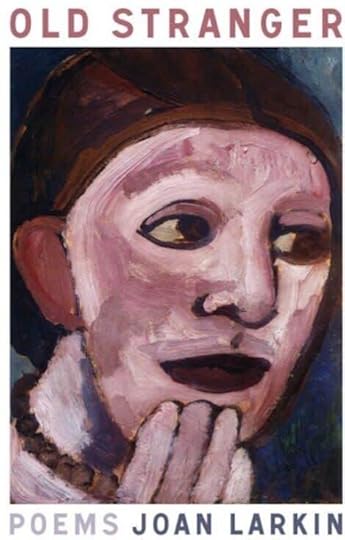On joan larkin’s old stranger

Does the the brevity of lyric poetry appeal to Millennial and Gen Z readers? The turns from narrative to lyric modes in Joan Larkin’s new poetry collection Old Stranger may be attractive to them then, but the poems will also resonate with readers who’ve attained longevity. An octogenarian, Larkin has been celebrated for blending lyric and narrative elements in her work and for nudging her poems toward resolution and epiphany. Her reliance on the lyric mode in Old Stranger intensifies as the collection progresses, while not entirely abandoning narrative. The superseding of narrative by lyric elements tends to form its own arc in a story about aging through perceptions of time and the past.
Larkin was born in Boston, a few months before the 1939 invasion of Poland that set off World War II. Eighteen years older than I, she is a writer I’ve respected as an elder who is always a generation ahead of me in experience, and in the wisdom that may come from it. I’ve followed her work for decades, beginning in the 1970’s at New Words Bookstore in Cambridge, Massachusetts, where I began seeking out queer and feminist literature as a teen. Now, almost 50 years later, Larkin’s poetry continues to create beauty and delight while offering wisdom as I enter my elderhood.
It’s uncommon for poets to have 50-year publishing careers, even now that life expectancy has grown over the past century. If a poet’s early work establishes their personal mythology, as Larkin’s did, what happens to that mythology over a lifetime? Does it grow stale, or get reassessed, or reinforced, or even abandoned? In Old Stranger, the subjects of Larkin’s foundational narratives – rape, abortion, miscarriage, coming out as lesbian, getting sober – are often reshaped through the lens of lyric, which emphasizes the distillation of seemingly truthful perceptions rather than the arc toward them. This turn to the lyric is a Swedish death cleaning of sorts that sweeps events to the side and prioritizes images of insight and emotional truth.
Of course, neither lyric nor narrative modes exist in separate bubbles. There’s a term in poetic discourse for combining them: the lyric-narrative poem. During the first months of an MFA program in the 1990’s, where I was struck by how much I did not know about poetry, “lyric-narrative poetry” especially confused me. Any initial recognition of ignorance may often play a part of the narrative arc of achieving wisdom, but I did not achieve any lasting wisdom on this point. Thirty years later, Old Stranger has revived my old confusion, especially in its poems treating narrative time as both rigid and flexible. Now, though, I can at least see the assumptions that stand in my way: that the lyric exists outside of time, but that narrative relies on time to be understood, and time relies on narrative to be parsed.
A disregard of narrative time first appears in the book’s fourth poem, “The Body Inside My Body,” where a second body, belonging to the speaker, asserts its power. This body wants “the breath it lost trying to escape / that afternoon in Hell’s Kitchen.” With short, declarative sentences establishing her authority, Larkin convinces me this alter-body can get that breath back. The poem offers hope to anyone with traumatic memories who, like the second body, “[h]as had it up to here with the scalding” and “wants the whole carcass unburied.” But the uncovering and implied dissection of the carcass of the past is just the beginning. The carcass’ obliteration is what this alter-body is after, as it wakes in a gothic setting that “any body wants,” where vultures “hiss in the low branches,” ready to do what vultures do. Who wouldn’t want painful events and their sequelae picked apart, swallowed, and annihilated by a vulture’s acid-bath gut?
Read the full review at On the Seawall



